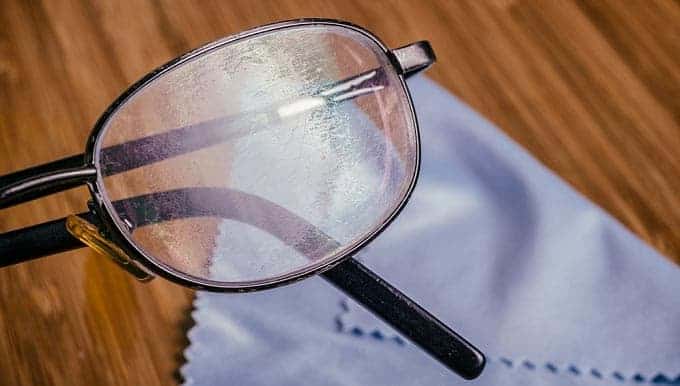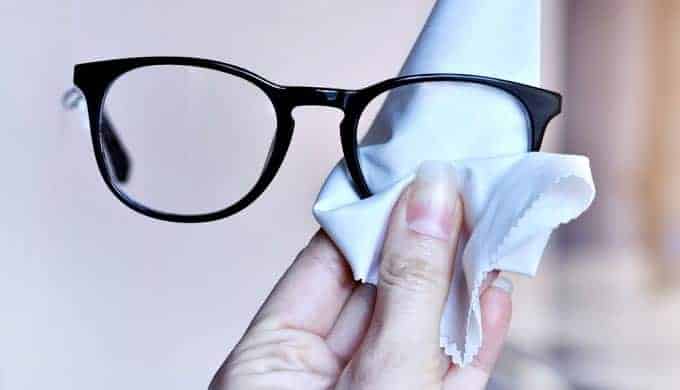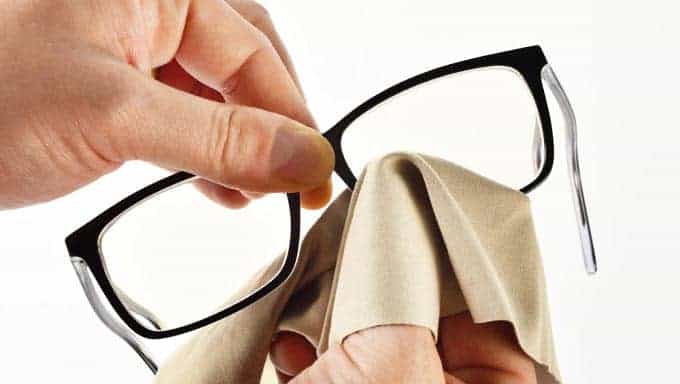Imagine heading out to work one chilly morning and while you are walking towards the bus stop, you take a sip of your morning coffee. Suddenly, you cannot see anything! Everything in front of you is white! What happened? Don’t worry. There is nothing wrong with you. It is just that you fogged up your glasses.
What would you say if I told you that this will be the last time that will happen? In this article, you will learn not only the basics of how to clean cloudy eyeglasses but also how to prevent this scenario from happening again.
Table of Contents
Cleaning Cloudy Lenses
- Grab a soft, clean piece of fabric
Do you still have the small piece of soft fabric that came with your glasses? That is a microfiber fabric, which is the most suitable material for cleaning eyeglasses. Although it does not look like it, microfiber fabric has even more surface area compared to other kinds of fabrics.
This is due to the millions of microscopic fibers inside the fabric, allowing the microfiber to pick up even the smallest speck of dirt. If you have lost or misplaced the microfiber fabric that came with your glasses, you can substitute it with another piece of cloth.
Just make sure that it is soft and not treated with fabric conditioner as it will cause streaks to appear on the lenses. Cotton fabric will do just as long as it is clean enough. However, you should avoid using the following:
- Wool and several other synthetic fabrics as they are too coarse
- Facial tissue or toilet paper as both will leave tiny scratches on the lens that would accumulate over time
- Clean with eyeglass cleaner
If you do not have any eyeglass cleaner at home, you can use mild dishwashing liquid soap and some warm water. Just make sure that your liquid soap does not have a citrus fragrance.
Wash your hands thoroughly to remove as much of the oil from your skin. Place a drop of liquid soap on the surface of the lens then use your finger to gently spread the soap all over the surface of your lenses. You do not have to work up a lather. The liquid soap will help you cut through the layer of grease and grime on the surface of the glass.
Completely rinse the lenses using warm water. Using the soft cloth that you procured earlier, wipe your glasses dry. After the application of glass cleaner on your lenses, use small, circular motions to dry and buff them up. Do not press too hard on the lenses as doing so might scratch or even cause the lens to pop out of the frame.
- Inspect the lenses if there are any stains
If your glasses are dirty, you might need an additional application of eyeglass cleaner to make your lenses completely clean and clear. If there are still stains that are on the surface, continue cleaning using liquid dish soap and some warm water. After washing, dry normally using your soft cloth.
- Scrub off the dirt and residue on the nose pads
Skin oils and dust collect in the nook between the nose pads and the lenses of the eyeglass, thereby creating a cloudy film on the lenses in the area near your nose. You can get rid of this oily residue using a soft-bristled toothbrush and some liquid dish soap and warm water.
- Fill a small plastic basin with warm water and put a couple of dabs of liquid soap.
- Dip your cleaning toothbrush into the soapy water and swirl it around
- Scrub the metal arm connecting the nose pad to the frame of your glasses. Be careful not to scrub the lenses themselves.
- Rinse your eyeglasses under some running warm water.
- After drying completely, inspect the area again carefully. If there are any remaining grime and oil buildup, repeat scrubbing until the area is completely clean.
Making Homemade Lens Cleaner
- Gather all the necessary supplies
The great thing about homemade lens cleaners is that they are so mild that they will not damage the film coating on top of the lenses like some other cleaning agents might. However, the mildness is just enough that you can still expect it to give a good job cleaning for your eyeglasses.
This is also a cheap alternative in case you forgot to restock your supply of eyeglass cleaner. To make your own homemade eyeglass lens cleaner, you will need the following materials:
- Liquid dish soap (non-citrus based)
- Rubbing alcohol (or witch hazel if you have it )
- Measuring cup
- Microfiber cleaning cloth
- Small spray bottle
- Water
- Prepare your materials
Make sure that the spray bottle and measuring cup are completely clean before you start mixing your cleaning solution. Any dirt or dust can contaminate the cleaning solution. This is especially important if the spray bottle you will be using used to contain other liquids.
Using the measuring cup, measure equal amounts of rubbing alcohol and water, and combine them in the spray bottle. Swirl the spray bottle gently to thoroughly combine the two liquids.
For this recipe, you will only need a very small amount of dishwashing liquid soap, a couple of drops will do. You just need it for some added dirt-fighting action. Depending on the size of your spray bottle, place a drop or two of liquid soap into the water and alcohol solution.
Replace the cap and swirl it vigorously to combine the ingredients thoroughly. Your homemade lens cleaning solution is now ready to use.
Note: The liquid soap is not just for helping clean the lenses. It will also act as a surfactant. This means it is a substance that lowers the surface tension of any water molecule that it comes in contact with. What this means is that your cleaning solution also acts as an anti-fogging solution.
Preventing your Glasses from Getting Cloudy
To ensure that your glasses do not get cloudy again, you can apply the following preventive tips and measures:
Always use a clean, soft microfiber cloth to clean it
Your glasses might have come with a small square of microfiber fabric and that is the ideal fabric to use for cleaning your eyeglasses. However, it is not immune to accumulating dirt over time.
The problem is that cleaning your lenses with a dirty fabric will only scratch the surface of your eyeglasses. With that in mind, you need to clean the microfiber fabric after a while, too.
Protect your microfiber cloth from the elements
If dust collects on your lens cleaning fabric, then there is a great chance that it will potentially do more damage to your lenses. Every time you use your cleaning cloth, you are adding more scratches on the surface of the lenses until one day, they will get so cloudy.
To keep your cleaning cloth clean, keep it inside the glasses carrying case. If you do not have a glass carrying case, you can place the cleaning cloth inside a resealable plastic bag. Always keep your cleaning cloth inside your bag so that you can have access to it anytime you need it.
Wash your lens cleaning cloth properly
If you are using cotton fabric for cleaning your eyeglasses, you can just wash it with your other laundry. However, if you are using a microfiber cloth, it should be washed separately. Here are some tips on how to wash microfiber fabrics:
- You should only wash it together with other microfiber fabrics.
- Use only a small amount of liquid detergent. Do not use bleach as well as a fabric softener. Using the latter will only leave streaks on the surface of your lenses.
- Use cold water to hand wash the microfiber.
- Air dry your microfiber cleaning cloth or use the dryer at low or no heat setting.
Clean your lenses regularly
It is only normal for your safety glasses to collect dirt, debris, and oil from your skin at the end of the day. Just by cleaning your eyeglasses regularly using lens cleaner, or even some warm water and a bit of dish soap, you will be able to cut down the amount of dirt that your glasses collect.
Keep your glasses in its carrying case
If you can still see well enough without your glasses on, you should keep your glasses in the carrying case to protect them against dust and dirt. This also serves as protection from impacts.
Also, make it a point to place your eyeglasses back in their case before you go to bed. This will prevent you from knocking your glasses off your night table during the early morning when you are reaching to turn off your alarm clock.
Conclusion
There is no permanent method to make your eyeglasses permanently fog-free. You can only expect them to remain fog-free as long as the anti-fog materials are still active. If the substance wears off, you just need to apply more of the stuff on your eyeglasses to continue enjoying their benefits.
If you know how to clean cloudy eyeglasses, you can boost your productivity. You will also feel a lot safer because your sight is always clear. This is very important if you are working as a heavy machinery operator wherein even a single moment of non-visibility can cause a lot of damage.

Having worked in the field of personal protective equipment for over two decades, Andrew Carnegie is a specialist in the field.
At EDC, he strives to improve performance efficiency and promote workplace safety for EDC’s readers and customers. He also researches the most up-to-date equipment that has earned relevant accreditation for use in a wide range of industries and specialties.





